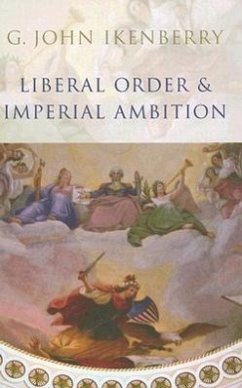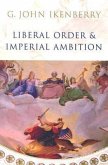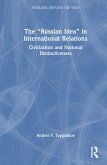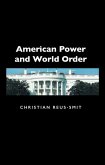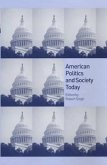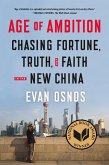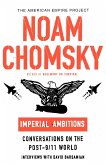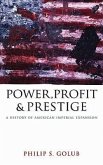This book of essays by the a leading figure in the new generation of American IR theorists explores the theoretical, historical, and foreign policy implications of American power and postwar order. The first part of the book focuses on the origins and foundational logic of America's post-war order-building project - advancing ideas about 'liberal hegemony' and 'constitutional order'. The second part reflects on its evolving character and fate in the aftermath of the Cold War, the rise of unipolarity, and the post-9/11 threat of global terrorism. In this unique study of a superpower, Ikenberry argues that though the American world order is now in upheaval, in the end, the United States still has powerful incentive to sponsor and operate within a liberal rules-based system.
Hinweis: Dieser Artikel kann nur an eine deutsche Lieferadresse ausgeliefert werden.
Hinweis: Dieser Artikel kann nur an eine deutsche Lieferadresse ausgeliefert werden.
"In this masterful work covering a decade of scholarship,John Ikenberry explains how American power has not been so muchconstrained by international institutions as embedded in them. TheBush administration's attempt to break out of perceivedinternational straightjackets in fact misunderstands the nature ofhegemonic power and represents an important break with earliertraditions of US foreign policy."
Francis Fukuyama
"The essays, taken one by one, constitute a fascinating journeycarrying the reader step by step through a scientific analysis ofthe origin, nature and evolution of American power."
International Spectator
"Ikenberry's arguments are the product of deepreflection and built through a structure that produces a clarityand crispness often lacking in such literature ... these essayswill stand out as a fine articulation of this particularinterpretation of US policy and one that is likely to haveconsiderable influence in the coming years."
International Affairs
"While he ranges over a number of topics, Ikenberryproduces a powerful critique of the view that the post-war orderrested solely on material power. [His] assessment rests onintellectual foundations that are marked by historical depth andphilosophical acuity."
Political Studies Review
"G. John Ikenberry is America's poet laureate of liberalinternationalism and the most gifted international relationsscholar of his generation."
Martin Walker, Editor, United Press International; WorldPolicy Institute at New York's New SchoolUniversity
"This is a splendid collections of essays, remarkable forthe sure-footed way they have mapped both the normative andexplanatory challenges at the heart of the troubled Americanengagement with the world."
Michael W. Doyle, Columbia University
"No other writer on international politics has done moreto advance our understanding of American power under conditions ofunipolarity than John Ikenberry. Never dull and always challenging,he has carved out an intellectual niche that has become uniquelyhis own over the past few years. With a clarity that iscommendable, and an intelligence that is obvious, he makes the casein these essays for something that has been too readily forgottenin our insecure age of terror: that for the United States,cooperation with others is not merely the nice thing to do but thesmart thing to do as well. A tour de force by one American wesimply cannot afford to ignore."
Michael Cox, London School of Economics
Francis Fukuyama
"The essays, taken one by one, constitute a fascinating journeycarrying the reader step by step through a scientific analysis ofthe origin, nature and evolution of American power."
International Spectator
"Ikenberry's arguments are the product of deepreflection and built through a structure that produces a clarityand crispness often lacking in such literature ... these essayswill stand out as a fine articulation of this particularinterpretation of US policy and one that is likely to haveconsiderable influence in the coming years."
International Affairs
"While he ranges over a number of topics, Ikenberryproduces a powerful critique of the view that the post-war orderrested solely on material power. [His] assessment rests onintellectual foundations that are marked by historical depth andphilosophical acuity."
Political Studies Review
"G. John Ikenberry is America's poet laureate of liberalinternationalism and the most gifted international relationsscholar of his generation."
Martin Walker, Editor, United Press International; WorldPolicy Institute at New York's New SchoolUniversity
"This is a splendid collections of essays, remarkable forthe sure-footed way they have mapped both the normative andexplanatory challenges at the heart of the troubled Americanengagement with the world."
Michael W. Doyle, Columbia University
"No other writer on international politics has done moreto advance our understanding of American power under conditions ofunipolarity than John Ikenberry. Never dull and always challenging,he has carved out an intellectual niche that has become uniquelyhis own over the past few years. With a clarity that iscommendable, and an intelligence that is obvious, he makes the casein these essays for something that has been too readily forgottenin our insecure age of terror: that for the United States,cooperation with others is not merely the nice thing to do but thesmart thing to do as well. A tour de force by one American wesimply cannot afford to ignore."
Michael Cox, London School of Economics

